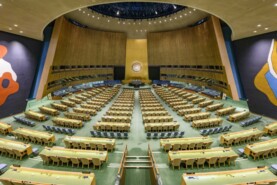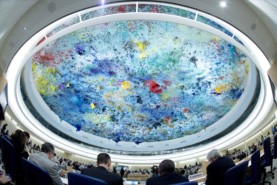Posted on 14 Sep 2023
As the final session of the UN cybercrime treaty negotiations draws near, lack of consensus among delegations is hampering the process. But is reaching a final agreement worth the outcome?
The penultimate session of the UN Ad Hoc Committee negotiating a treaty on cybercrime (or the criminal misuse of information and communications technology, ICT) took place in New York from 21 August to 1 September 2023. The aim of the meeting was to agree on as many provisions as possible before the final negotiating session takes place in early 2024. However, the committee took the 37-page draft presented to them by the Chair and ended the meeting with 40 pages of new text added (much of it from diametrically opposed perspectives), with a small minority of peripheral provisions provisionally agreed.
Thus, the Chair’s hopes for big steps forward and for delegations to put aside their differences appeared to have been dashed. However, discussions in informal sessions and on the margins seemed to show some initial signs of progress on one of the major areas of polarization – the scope of the convention and therefore the kind of international cooperation it will facilitate. But the compromise proposals under discussion have done little to dispel fears that the convention could be used as a tool of repression by authoritarian states.
Countries continue to reach for a broader scope
In its pre-session analysis, the Global Initiative Against Transnational Organized Crime noted that the draft presented to the committee had been strengthened by the removal of some of the most controversial elements proposed for the convention’s scope, although concerns about how rights would be safeguarded and risks of repression remained. But the tone of the meeting was set when Russia objected to the narrow scope of the treaty and called for the reintroduction of the broad range of ‘crimes’ it wanted covered by the treaty. China, Iran and others who favour a broad scope for the convention also proposed the reintroduction of a wide range of issues that can be loosely described as cyber-enabled offences, including:
- The use of ICTs to call for ‘subversive or armed activities directed towards the violent overthrow of the regime of another State’; the use of ICTs to incite extremism, ‘humiliation’ of other races; and ‘dissemination of materials that deny, approve, justify or rehabilitate actions that amount to genocide or crimes against peace and humanity’, which would replace earlier text proposals that referred more explicitly to Nazism.
- Clauses on terrorism, including the criminalization of ‘spreading of strife, sedition, hatred or racism’, as well as ‘encouragement or coercion to suicide’ and disrupting critical infrastructure using ICTs.
- The use of ICTs for drug trafficking, arms trafficking, property transfer, illicit use of online payment systems and the trafficking in counterfeit medical products. (Russia also proposed a provision covering ‘any unlawful act’ committed using ICTs that ‘causes significant damage’.)
- The provision of network services used for criminal purposes, and the use of ICTs for ‘the organization, planning, and commission of violent acts that pose a serious threat to public safety, including but not limited to explosions and indiscriminative violences’ (proposed by China).
- Incitement to violence (proposed by Pakistan), drug trafficking (Egypt and China) and money laundering (Yemen).
Given that the Chair’s proposed text identified a specific range of cyber-dependent crimes, in addition to offences related to child sexual abuse material (as the only cyber-enabled crime), these proposals to broaden the scope of the convention found the penultimate session subjected to the same polarization that has characterized this process since its inception. As the session progressed, each chapter was subjected to the same treatment from all sides of the debate – with fundamental arguments about the scope of the convention and its potential for cooperation at the centre of discussions.
What is in scope?
In addition to the plenary, a number of informal groups had been mandated by the Chair to consider some of the key issues that remain to be decided. Some of the most detailed discussions, resulting in ‘options’ published on the Ad Hoc Committee website, came from Group 4, which examined the scope of application of the treaty.
These discussions built on earlier positions of some Western delegations, namely that while criminalization of offences under the treaty should be clear and narrow, they could be open to a broader range of cooperation. Other delegations, however, took a more consistent position on the need to maintain a narrow scope across the board, with Canada and New Zealand in particular setting out this position in the plenary.
One option put forward is to limit the scope of application to the crimes in the treaty, but to open up the chapter on international cooperation. This would allow the exchange of electronic evidence for any ‘crime’ committed using an ICT for which the penalty is three years’ imprisonment (although the length of time is not yet agreed) or more, including offences covered by the provisions of other UN treaties. This proposal was made on the understanding that Article 17, which sought to open the same door for cooperation on other crimes outside of the treaty, would be deleted.
The threshold of three to four years’ imprisonment is inspired by the UN Convention against Transnational Organized Crime (UNTOC, which has a four-year threshold for ‘serious crimes’), but cooperation under the UNTOC has built-in safeguards and limitations, as it applies only to crimes committed by a structured criminal group across borders. A state official, therefore, could not seek cooperation or evidence under the UNTOC against an individual who disseminates content that is critical of their government online while residing in another country. A compromise on this basis would allow authoritarian regimes to do just that, and even if they may already cooperate bilaterally, they would now have the UN’s endorsement under the convention.
Governments would also receive capacity building and technical assistance to train them in the implementation of the cybercrime treaty. If a compromise on broad cooperation is reached, the capacity building could enable states to target individuals guilty of engaging in activities such as social media posting, research, journalism or anything else that could be perceived by the government as a ‘crime’, and providing information to and receiving information from other countries.
Diplomats are keen to make progress on the main issues of concern in the treaty, especially as there have been 12 weeks of negotiations at the cost of significant financial and human resources. But for a successful conclusion, the negotiations urgently need clarity on a clear and narrow scope in the convention and principles of cooperation. Any ambiguity or compromise that opens the door to broad cooperation powers carries not only political risks for the governments involved, but also real risks for activists, journalists and ordinary people, and reduces the benefits of the convention as an instrument to respond effectively to cyber criminality.
A strong push for consensus on an ambiguous and broad treaty could result in the adoption of a UN convention that legitimizes or encourages the targeting and sharing of evidence against individuals, thus providing a legal basis for the UN to run counter to its own human rights obligations and priorities, and putting states on a difficult path to ratification in their own systems. The committee can of course invoke its agreed rules and start voting on the treaty, or sections of the treaty, at the last session in early 2024. A criminal justice treaty created in this way would surely be in inauspicious beginning, and consensus is still the shared aim. But the committee undoubtedly has a steep hill to climb if it is to reach agreement at its final session in New York in early 2024. Now is the time for governments to calculate the cost of that consensus.
This article is supported by the Swiss Permanent Mission to the United Nations in Vienna. The views expressed do not necessarily reflect the views of the Swiss government.



